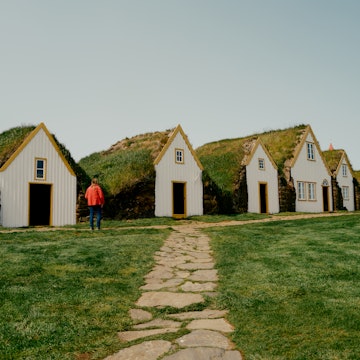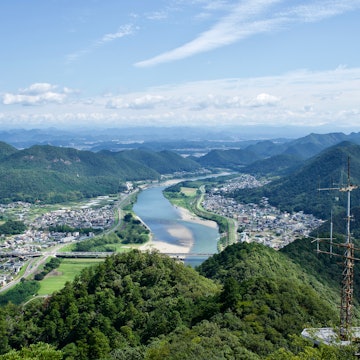
Some countries want us to visit - but are we ready to travel?

Jun 18, 2020 • 6 min read

The pandemic has made travelers reconsider the type of trips undertaken. © Borja Yedra Madero / 500px
There’s finally a chink of light appearing through the clouds of enforced lockdowns. After months of closed borders, canceled holidays and grounded airplanes, Greece, Portugal, Spain, and France are keen for travelers to visit again – but are holidaymakers ready to return?
European airlines have their fingers firmly crossed. Carriers, which would usually be running up to 2500 flights a day, are slowly reopening their networks. By July, easyJet hopes to resume 50% of its routes with Ryanair aiming to restart 40% of its own.
But are travelers as keen? We spoke to several to find out.

"It’ll be fine – a plane is no different to the train"
“My mum and I are looking into going to Portugal in the second week of August,” says Felipe Perez Silva. He usually visits his family in Lisbon twice a year, but 2020 will be extra special as it’s his grandmother's 85th birthday.
“We're in a unique position,” he says, “we're not staying in a hotel or an Airbnb, we're going just to stay with family.” While this will limit the number of interactions with strangers, Felipe’s auntie has already had COVID-19.
“Luckily, she only had mild symptoms,” says Felipe. “But in Portugal if you have symptoms, you get tested, and then there’s a two-week incubation period where you have to isolate yourself from others. My auntie was tested every week until the symptoms had gone. She is now clear.”
Currently the FCO advises British nationals against all but essential international travel, but as soon as that’s lifted, Felipe will book his flights. “In terms of the travel – from London to Lisbon – we will go through the same procedures as you would get on the train,” he says. “There's no difference between sitting next to someone in close proximity on a train than sitting next to someone on the plane.
“We’ll do what we call the Naomi Campbell treatment,” he says laughing. “Before you take a seat, you get your disinfectant wipes and you wipe down your chair, your tray and your screens to make sure that everything is safe,” alluding to the model’s airplane cleaning regime.
Masks will be mandatory on flights this summer and Felipe says he’ll wear gloves too. He’ll also adhere to all local laws. “People are starting to go back to the beach and social-distancing is in place,” he says, “I think it will be fine.”

"Self-catering in the countryside is now a lot more appealing"
Catherine Floyd was due to hike through South Africa’s Drakensberg mountains in March when news filtered through about lockdowns in Spain and Italy. She had already visited Cape Town and the Winelands on her month-long trip, but now her mum was anxiously checking in.
“I was thinking that it's probably nothing and I should carry on with my holiday,” she says. “I was two weeks into my trip and I thought about SARS and Ebola and all these pandemics that never [went global].”
However, the trek would’ve meant that Catherine had little outside contact. “I would literally be in the middle of nowhere,” she says, “so if I found out that London was going into lockdown in two days, I wouldn't even know, and it would take ages to get to an airport and leave.”
Catherine canceled the rest of her holiday and returned to the UK. She hopes to finish the trip, but not until 2021 at the earliest. "I'm not worried about getting sick at all," she says, "but I think that going to countries that don't want you there is unappealing."
The pandemic has made Catherine reconsider the type of trips she’ll take too. “What I want on a city break, is to sit in a coffee shop and watch people,” she says. “I could sit behind a perspex spit screen, 10m from anyone, with everyone wearing masks, but I won't have a nice time. Self-catering in the countryside is now a lot more appealing.”

"It's not stopping me from wanting to visit the UK"
As some borders reopened within the EU, it didn’t take Coralie Modschiedler long to take advantage. “We’re very close to Italy, about half an hour from the border,” the Nice resident says, “and like a lot of smokers living here, we tend to go to Italy to buy cigarettes because they're half the price.”
So as soon as restrictions were relaxed, Coralie drove to Ventimiglia, a medieval coastal town on the Mediterranean Sea, and then onto San Remo. It wasn’t just about the cigarettes, but breathing in a sense of ordinariness as well.
“Things are a lot more relaxed in Italy,” she says. “We were able to walk about and have ice cream. It's just nice because things are returning to normal.”
The old Nice is starting to stir too. Coralie says the soft, shining pebbled beaches are filling up with socially distanced sun seekers, the cafe terraces are buzzing, and restaurants have used lockdown to redecorate and upgrade.
Her heart, however, is set on a trip to London to see friends. “I would feel less worried about going to another European country where there wasn't as much spread of the virus,” she says, “but it's not stopping me from wanting to go back to the UK.”
As soon as the UK’s two-week quarantine period is removed, Coralie is likely to visit. “It will probably be August at the earliest because I'd like things to improve in England,” she says. “Though I might not go to museums and enclosed places, but to parks and outdoor bars instead.”

"I'm not up for getting on a plane at all"
Asha Mehr first started feeling unwell on 15 March. At first she had a headache and flu-like symptoms, but 10 days later, her condition started to worsen. “I started feeling like I just couldn’t get out of bed,” she says. “My chest felt so heavy and my breathing was really, really heavy and labored. There were times I was lying in bed just breathing, thinking, ‘oh, this is a bit scary.’”
Eight weeks after falling ill, Asha’s condition deteriorated and paramedics were called to her home. “I had a week of blood tests and chest x-rays,” she says, “they were checking for blood clots.” Though she remains untested, doctors believe her symptoms match those of someone with COVID-19.
Asha was planning to visit the Philippines in 2020, but the pandemic has scuppered her plans. Now she doesn’t want to travel. “I'm not up for getting on a plane or going to an airport at all,” she says. “I'd quite like to go away within the UK. I definitely miss going away for day trips or the weekend, but [I don’t want to] travel abroad.”
“People get the impression that I might feel less concerned or worried about life now I’ve had COVID-19, but actually I feel the opposite,” she continues. “We don't know if you can get it a second time and we don't know how long any sort of antibodies last for. In a few months time, I might not have any immunity left.”
No travel measures will convince Asha to change her mind. “At some airports you have to have your temperature taken, but I never had a fever. A lot of people don't have a temperature with COVID,” she says. “Coronavirus-free certificates are very interesting. But how are you traveling to the airport? Who have you been in contact with? Are there other ways that you could then have picked it up in the meantime?”
You might also like:
Here's what you need to know about safe travel in France
Ask Lonely Planet: 'Will flights cost a lot more after COVID-19?'
Lonely Planet writers on the first place they want to return to













